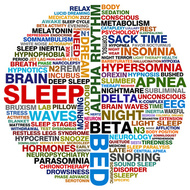 As a Reflexologist, I always ask clients about their sleep patterns, because a good night's sleep is so important to general well-being. And better sleep is often one of the additional benefits of a Reflexology treatment as the majority of my clients report having had a great night's sleep after a treatment. The Harvard Women’s Health Watch suggests six reasons to get enough sleep: * a good night's sleep can help learning and memory; * chronic sleep deprivation may cause weight gain by affecting the way our bodies process and store carbohydrates, and by altering levels of hormones that affect our appetite; * insufficient sleep can lead to poor performance and accidents; * sleep loss may result in irritability, impatience, inability to concentrate, and moodiness; * serious sleep disorders have been linked to hypertension, increased stress hormone levels, and irregular heartbeat; * sleep deprivation alters immune function, including the activity of the body’s killer cells. Here are ways to get a better night's sleep: 1. Have a sleep routine Going to bed and waking at the same time (even at weekends) helps to improve your ability to sleep and the quality of that sleep. Avoid evening naps by keeping active until bedtime. 2. Get out into natural light Long days in the office under artificial light can make your brain sleepy, while hours in front of a TV or computer screen can suppress the body's production of melatonin, making it harder to sleep. Get out during the day - walk to or from work or go for a walk at lunchtime - even in winter when light levels are poor, this will help your sleep patterns. The exercise you get from your walk will also help you sleep better at night. 3. Make sure your bedroom is sleep friendly Keep your bedroom cool and well ventilated. Keep your bedroom dark - use blackout blinds or a mask to keep light out. Have your bedroom as quiet as possible, and if you can't avoid noises from neighbours or barking dogs, use soothing sounds or earplugs to mask external noise. And, of course, make sure your bed is comfy. If you wake with a sore back or aching neck it may be a sign that you need a new mattress or a different pillow. 4. Prepare for bed Have a bedtime routine: as well as brushing your teeth and getting ready for bed, incorporate relaxing activities into your bedtime routine: try doing a 15 minute relaxation, or some gentle yoga exercises. To allow you to be totally relaxed, empty your head: write down all the things that you want to do tomorrow, or anything that is worrying you, or anything that you need to think about, or anything that you need to remember to do. Get it all down on paper, so there's nothing for your mind to chew on as you try to get to sleep. 5. Eat yourself sleepy For a better night's sleep avoid big meals and fatty food late at night, alcohol, caffeine, and smoking all of which will disrupt sleep patterns. If you find yourself waking at night for a snack, try having a light snack before bed - a handful of almonds or a couple of oatcakes with half a banana, honey, a slice of turkey or cheese may help keep your blood sugar stable throughout the night. You might also want to have a cup of chamomile tea or a glass of warm milk. 6. Get rid of anxiety If worry keeps you awake at night, this is may be a stress problem, not a sleep problem and you need to address the source of your worry. You may benefit from meditation, or you may need to learn how to manage your thoughts, or perhaps enrol on a stress management course. If it's a problem and you're not sure what to do for the best, go to your GP for advice. 7. Try a Reflexology treatment Sometimes it's nice not to have to do everything yourself, so consider getting support from a Reflexology treatment. Many clients talk about getting a great night's sleep after a treatment - it's almost as it a Reflexology session has the effect of pressing a reset button in the body. That's not to say that you won't need to take action yourself, but you know what they say about a problem shared is a problem halved! If you're experiencing poor sleep and would like to try Reflexology to discover if it will help, click this link to email me and ask about my special discount for new clients. Wishing you sweet dreams.
0 Comments
Maximise your fertility, naturallyHave you been trying to conceive for 12 months or more, without success?
Are you confused by all the conflicting information on the internet? Would you like to feel more supported with your efforts to get pregnant? Fertility Support Workshops
Sign up for a series of 6 Fertility Support Workshops: Only 10 places available When: Mondays 7.30-9pm on: 22 Sept, 6 Oct, 20 Oct, 3 Nov, 17 Nov, 1 Dec 2014 Where: The Sir Arthur Conan Doyle Centre 25 Palmerston Place, Edinburgh How Much: £15 per session Book: Contact Doris Wylie on 07724 197627 or email [email protected] Doris Wylie Lothian Reflexology www.lothianreflexology.co.uk 07724 197627 www.facebook.com/lothianreflexology 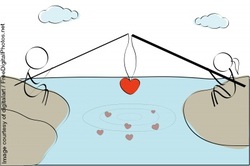 If you'd like to conceive, I'd ask you to look at all the highs and lows of your fertility journey. I know you'd do anything to get pregnant, so I'd like you to ask yourself ... are you trying too hard? Trying might not be a useful thing to do, in fact it may actually hinder all your best efforts, because trying is about : endeavour, difficulty, becoming annoyed – or so the dictionary says. Trying is all about chasing after your dream rather than waiting to receive it. Trying is all about forcing your heart's desire into being rather than allowing it to materialise in it's own good time. Trying is about control rather than being in a state of flow. Are you chasing your dream of having a baby rather than being ready to receive with open arms? May I suggest that this might not be the best strategy. And here’s why ... Imaging you were to go fishing. If you were to go fishing, you’d pack your kit – everything you need to land that prizewinning fish. You’d pick the perfect spot where you know the fish are likely to be. You’d set your bait and cast your line and then you’d sit back and relax and wait for the fish to bite. And while you’re waiting for the fish to bite you’d likely just enjoy being out in the fresh air, in the peace and quiet, giving yourself time to settle and release, and letting your worries and cares wash away. What you wouldn’t do is: jump into the car with no equipment. Then stop at any old spot without checking first to find out how the fishing was. And race into the water fully clothed, trying to catch the fish with your bare hands! That would just be ridiculous, wouldn't it? The very act of “trying”, creates a level of stress that is more likely to take you away from what you want instead of closer to it. You effectively create obstacles that wouldn’t otherwise exist as a consequence of your desire to increase your chances of getting pregnant. You begin to get in your own way! Can I just say that again, "You begin to get in your own way"! This is not always an easy concept to process when your sole goal in life is to get pregnant, so please give it some thought. May I suggest that you might choose to let go, stop "trying", chill and just wait for the fish to bite. And if you need some help with your fertility journey, check out how Fertility Reflexology could help. If you want more tips like this, you’ll find them in the Free Baby Making Mindset Club, just go to https://www.facebook.com/groups/1422257428013810/ 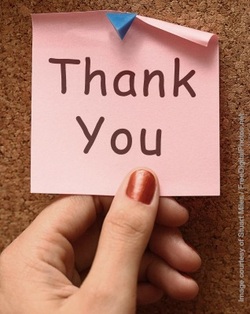 I've been prompted by some recent facebook posts, to blog about gratitude. Many of my facebook friends have been posting each day about what they're grateful for and it's really interesting to see that it's not the big things they choose, but the small, seemingly insignificant things that get onto their list. In our busy lives, full of targets and deadlines, responsibilities and commitments, hopes and aspirations we can sometimes be so busy and stressed that we forget what we have to be grateful for. When was the last time you paused to be grateful for the food you eat, or the home that shelters you, or the friends and family who support you? It’s all too easy to take the things and people in our lives for granted, and it can be a real challenge to find time to stop and catch our breath, never mind to stop to cultivate gratitude. But give it a try, you may find it well worth the effort. Being grateful for what you’ve got allows you to:
Every day, write down three things that you’re grateful for and watch your peace of mind grow! 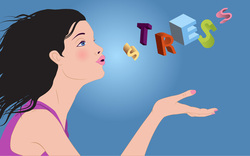 The International Stress Management Association launched their 2008 National Stress Awareness Day with their top ten stress busters:
Pick one items from the list and put it into practice and see how well it works for you. Or you could come for a relaxing Reflexology or Indian Head Massage and let someone else take the strain for a change. Just call Doris on 07724 197627 to book your appointment. And remember there's a special JULY OFFER: £10 off your first treatment - but only if you book in July (appointments can be scheduled for August). 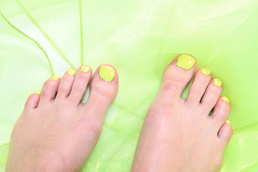 Reflexologists believe that your feet reflect physical imbalances in the body, but can they also reflect your personality? Check out the following and see for yourself. WIDE FEET You’re a hard worker and you like to keep busy - you really can’t sit still and you’re happiest when you’re busy. But activity needs to be balanced with stillness and you should try to make time for a little peace and calm in your life. LONG NARROW FEET You love to be surrounded by beautiful things, be in beautiful places and you love being pampered. You have a real ability to delegate and would much rather someone else did all the work. The Chinese would say you have Princess feet - you were born to be waited on, but make sure it doesn't alienate those around you. ARCHES High arches - these reflect a strong desire to be independent and self-sufficient. You go off on your own a lot and might even be accused of being anti-social. In Chinese philosophy, those with very high arches are in danger of being brittle and rigid. Low or average arches - these mean that you enjoy the company of others, are sociable and fairly extrovert. You like to have a good time and want everyone around you to have a great time too. THE BIG TOE - The big toe is the thinking toe (head) Longer than the other toes - you are a clever, creative thinker who comes up with ingenious solutions to problems and never runs out of ideas. You’re never stumped for an answer, and can see things from different angles. But it's likely you're good at starting but poor at finishing and you pursue the next great idea and you can be easily distracted. Smaller than the other toes - you are a superb multi-tasker, very efficient and a great delegater. Big toe overlaps your second toe - this generally indicates head over heart and vice versa. Massive toe pads - you're a very deep thinker and you like to consider everything carefully, but you may be prone to paralysis by analysis. THE SECOND TOE - The second toe is your feeling toe (heart) Long second toe - an indication of leadership qualities - the longer the toe the more pronounced the leadership qualities. You are a resourceful dynamo and want it all your way, but it can come across as being bossy. Indian folklore has it that eagle-eyed mothers stopped their sons marrying girls with long second toes because it meant they were far too bossy! Smaller second toe - means you're happy to bide your time. You'd rather have a harmonious outcome and won’t try to force things through. Gap between second and third toe - this means you are not emotionally engaged in your activities. This might be because the work requires you to be detached, or it may be because you don't enjoy what you are doing. Second toe narrow at the base and wide at the tip- this indicates some "drama queen" tendancies: whatever you're feeling, whether it's great or gloomy, will be expressed in a BIG way, bigger than you feel it. Second toe on left foot leaning towards big toe - this is a sign of a sentimental, nostalgic nature - shared by Hollywood actress Reece Witherspoon. THE THIRD TOE - The third toe is your doing toe The Chinese associate energy, drive and willpower with the third toe. Long third toe - this means you are highly resourceful and energetic, especially at work. And the longer the toe, the more driven you are to succeed. You can be aperfectionist, but you have a tendency to be a workacholic and forget about fun, love and family. Short third toe - this indicates that you enjoy the pleasures in life and love to relax. You're not inclined to get worked up about things and although you may be accused of being lazy, you feel that you just like to enjoy life. Third toe tilted so nail faces towards the little toe - this means you're great at forward planning and able to look forward and consider the next steps. Last joint of third toe at an angle - You have the natural ability to deceive, as well as the propensity to be misunderstood. Frequently to be found in spies! THE FOURTH TOE - The fourth toe is your relationship toe Long and straight fourth toe - this indicates the importance of family in your life. Unhappiness in your relationships with loved ones will show up in a curling of this toe. You are a superb listener and nurturer, but will be deeply affected by unhappiness within the family. You find it hard to cut yourself off from other people’s problems. Short fourth toe - this means that family and relationships are less crucial to you — your focus is elsewhere. THE LITTLE TOE - The little toe – the moving toe (expansiveness and freedom of thought) Small little toe - this characterises someone with a childlike impish nature: someone who doesn't want responsibility, is easily bored and is constantly looking for amusing diversions. This person is great fun to be with, but don't look for them to be steady and reliable. The smaller the little toe to stronger these characteristics. Little toe on its side - If your little toe is on its side with the nail facing the wall instead of the ceiling then you are unconventional and rebellious and follow your own path. Little toe separates from fourth toe - this indicates someone who is impulsive, adventurous and a charming flirt. This person hates routine and is needs constant change. Little toe can't separate from fourth toe - this reflects someone who likes routine in order to feel security. They will be loyal, reliable, and trustworthy and don't want too many surprises. We could set our clocks by them! And other characteristics of your toes are: Well spaced – open minded with plenty of room to expand the mind and be inspired, but if there's a gap between your big toe and first toe, it may mean that you agree to things and then wish you hadn't - the head and the feelings aren't working in harmony. Bent – fearful of responsibility or bends to other people’s beliefs. Crushed – dominated, smothered or stifled. Overlapping – no room for own ideas, lacks freedom of thought. Sloping – insecure and inflexible. May change ideas to please others. Squashed – conforms to rigid beliefs, leaving no room for own thoughts. Stands alone – need space to think. Twisted – turning away from the truth, looking to others for reassurance. Uneven toes – inconsistent, erratic thoughts. Tendon showing at base of big toe when feet at rest - If just your big toe tendon shows when you are sitting in a chair with your feet flat on the floor, then you are self-disciplined. Toes that neatly graduate in size - If each toe is a little longer than the one before, creating a neat line, this indicates a methodical, precise and extremely practical person. You’re interested in detail and ensure that you always finish what you start. You’re a dream employee, and a good friend — loyal and steadfast to a fault. Watch out for a tendency to nitpick, though — not everyone is as balanced as you. And talking about feet and what they say about you, I'd just like to remind you that I have a special JULY OFFER: £10 off your first treatment of Reflexology or Indian Head Massage, so please help me spread the word. This offer is only available for treatments booked in July, so don't delay. To book just call Doris on 07724 197627. If you've never tried Reflexology and don't know what it is, here's a brief rundown:
What is Reflexology?
How does Reflexology work? Reflexology uses finger pressure on the feet to relax and re-balance the whole person in mind, body and emotion. It works on the principle that various parts of the feet relate to corresponding parts of the body and that by working on the feet the Reflexologist can create a balancing effect. The finger pressure on the feet is firm, so it should not feel tickly. Who can benefit from Reflexology? Anyone can benefit from Reflexology: from newborn babies to those receiving end of life care, and anyone in between, but it is particularly beneficial for anyone who is experiencing ill-health and in particular those suffering from stress or stress related illnesses. There may however be times when it is not appropriate to provide a treatment, so if you're not sure, do ask. Reflexologists often specialise in particular areas, such as: fertility, pregnancy, babies, children, ageing well, pain relief, sleep, stress, cancer care, and end of life care. What happens in a Reflexology treatment? The Reflexologist will take a few moments to gather information about the client's condition (it tends to take a bit longer for the first treatment), and then the client is made comfortable, lying on a special chair or massage table. It's possible to chat during the treatment, but it's more relaxing to just close your eyes and enjoy the experience. It's not uncommon for clients to drift off into a light doze. How will I feel after a treatment? Well, everyone is different, but generally clients will feel deeply relaxed after a treatment. Clients often report having had a good night's sleep and a boost in their energy levels after a treatment. Really the only way to know is to give the treatment a try. There have been some positive research projects carried out with reflexology; however, as yet, there is not a large enough body of evidence to make clinical claims of effectiveness. With ever increasing levels of stress in everyday life, it is important for people to take more responsibility for their own healthcare needs. Reflexology may be one of the ways to mitigate the stresses of modern life. Reflexology should not be used as an alternative to seeking medical advice. The only way to know if Reflexology will be beneficial for you is to give it a try. If you're ever feeling stressed or a bit out of sorts, think about having a Reflexology treatment to get you onto more of an even keel. To make the decision easier, I offer £5 off your first treatment. This applies to everyone, so you don't need a special voucher or ticket, it is just automatically applied when you pay for your treatment. For July, I'm offering an extra £5 off to all new clients. That means you get £10 off your first treatment if you book in July. But this offer only applies to July 2014, so don't delay, book your treatment today by calling Doris on 07724 197627, or email [email protected]. 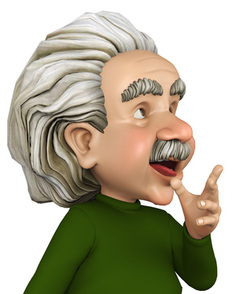 We cannot solve our problems with the same thinking we used when we created them. - Albert Einstein Do you have problems that you just can't seem to solve? Are there issues in your life that seem constant, regardless of how hard you try to overcome them? Do you feel you stuck in a rut, getting nowhere fast? The definition of insanity is doing the same thing over and over again, but expecting a different outcome. I mean really, wouldn’t you need to be mad to think that somehow, magically, one time, if you keep doing the same thing, you’re going to get a different outcome? So if you want to get a different outcome, you need to do something different. If you want to feel differently you need to think or act differently. But what do you need to do? Well perhaps you already know... have you've been saying to yourself – “If I just did A, B or C it would help me to X, Y or Z”, so for example –
But how to you stop getting anxious, look after yourself better and do something new? It’s not always easy. I'm a great believer in the path of least resistance. Why put huge amounts of effort into overcoming resistance when you can just go round it with no effort at all. It's not about being lazy (well not much!), it's about being sensible and efficient - why make things hard for yourself if you don't need to. And that's one of the reasons I love Reflexology! Reflexology is a physical approach that can impact on mental and emotional states. Our mind, body and emotions are not separate entities, they're all part of us and if one part is out of balance, all of us is out of balance. So, Reflexology is not just for those wishing physical benefits (although it's great at providing that), it's for anyone who feels an imbalance in mind, body or emotion. For example, if you are going through a challenging time emotionally, and all the talking about it has taken you nowhere, perhaps a relaxing Reflexology treatment will allow you to feel more in tune with yourself and less anxious, angry, fearful, or whatever other emotions are implicit in your situation. And if you feel less anxious, angry, fearful, etc you will respond in a different way and your problem will appear in a different light to you. So, if thinking about something causes you to feel a certain way, then changing the way you feel can cause you to change the way you think. No effort, no resistance, no problem (or at least less of a problem). And with Reflexology, you just sit back and let someone else take the strain. So, if you're making things hard for yourself, give yourself a break and if you haven't tried it before, give Reflexology a chance. To book an appointment, contact me (Doris) on 07724 197627. |
|

